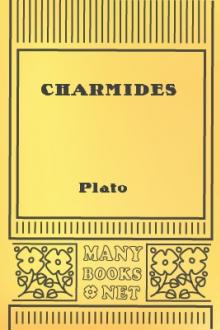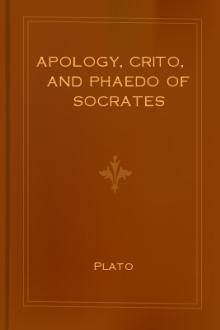author - "Plato"

Eleatics. For of all the pre-Socratic philosophers, he speaks of them with the greatest respect. But he could hardly have passed upon them a more unmeaning slight than to ascribe to their great master tenets the reverse of those which he actually held.Two preliminary remarks may be made. First, that whatever latitude we may allow to Plato in bringing together by a 'tour de force,' as in the Phaedrus, dissimilar themes, yet he always in some way seeks to find a connexion for them. Many threads

dialogue is what would be called in the language of Thrasyllus tentative or inquisitive. The subject is continued in the Phaedrus and Symposium, and treated, with a manifest reference to the Lysis, in the eighth and ninth books of the Nicomachean Ethics of Aristotle. As in other writings of Plato (for example, the Republic), there is a progress from unconscious morality, illustrated by the friendship of the two youths, and also by the sayings of the poets ('who are our fathers in wisdom,' and

s. They were careful to preserve the number of fighting men and women at 20,000, which is equal to that of the present military force. And so they passed their lives as guardians of the citizens and leaders of the Hellenes. They were a just and famous race, celebrated for their beauty and virtue all over Europe and Asia.And now I will speak to you of their adversaries, but first I ought to explain that the Greek names were given to Solon in an Egyptian form, and he enquired their meaning and

ther of body or mind, must be under the direction of knowledge. Upon the assumption just made, then, virtue is teachable. But where are the teachers? There are none to be found. This is extremely discouraging. Virtue is no sooner discovered to be teachable, than the discovery follows that it is not taught. Virtue, therefore, is and is not teachable.In this dilemma an appeal is made to Anytus, a respectable and well-to-do citizen of the old school, and a family friend of Meno, who happens to be

ot worthy of much consideration. For why shouldAristotle, because he has quoted several Dialogues of Plato, have quotedthem all? Something must be allowed to chance, and to the nature of thesubjects treated of in them.) On the other hand, Mr. Grote trusts mainlyto the Alexandrian Canon. But I hardly think that we are justified inattributing much weight to the authority of the Alexandrian librarians inan age when there was no regular publication of books, and every temptationto forge them; and

hen? Whence have these calumnies against you arisen? For surely if you had not busied yourself more than others, such a report and story would never have got abroad, unless you had done something different from what most men do. Tell us, therefore, what it is, that we may not pass a hasty judgment on you." He who speaks thus appears to me to speak justly, and I will endeavor to show you what it is that has occasioned me this character and imputation. Listen, then: to some of you perhaps I

the flavour ofSocratic irony in the narrative of Xenophon.The Apology or Platonic defence of Socrates is divided into three parts:1st. The defence properly so called; 2nd. The shorter address in mitigationof the penalty; 3rd. The last words of prophetic rebuke and exhortation. The first part commences with an apology for his colloquial style; he is,as he has always been, the enemy of rhetoric, and knows of no rhetoric buttruth; he will not falsify his character by making a speech. Then

fluence. The Republic of Plato is also the first treatise upon education, of which the writings of Milton and Locke, Rousseau, Jean Paul, and Goethe are the legitimate descendants. Like Dante or Bunyan, he has a revelation of another life; like Bacon, he is profoundly impressed with the unity of knowledge; in the early Church he exercised a real influence on theology, and at the Revival of Literature on politics. Even the fragments of his words when 'repeated at second-hand' (Symp.) have in all

Eleatics. For of all the pre-Socratic philosophers, he speaks of them with the greatest respect. But he could hardly have passed upon them a more unmeaning slight than to ascribe to their great master tenets the reverse of those which he actually held.Two preliminary remarks may be made. First, that whatever latitude we may allow to Plato in bringing together by a 'tour de force,' as in the Phaedrus, dissimilar themes, yet he always in some way seeks to find a connexion for them. Many threads

dialogue is what would be called in the language of Thrasyllus tentative or inquisitive. The subject is continued in the Phaedrus and Symposium, and treated, with a manifest reference to the Lysis, in the eighth and ninth books of the Nicomachean Ethics of Aristotle. As in other writings of Plato (for example, the Republic), there is a progress from unconscious morality, illustrated by the friendship of the two youths, and also by the sayings of the poets ('who are our fathers in wisdom,' and

s. They were careful to preserve the number of fighting men and women at 20,000, which is equal to that of the present military force. And so they passed their lives as guardians of the citizens and leaders of the Hellenes. They were a just and famous race, celebrated for their beauty and virtue all over Europe and Asia.And now I will speak to you of their adversaries, but first I ought to explain that the Greek names were given to Solon in an Egyptian form, and he enquired their meaning and

ther of body or mind, must be under the direction of knowledge. Upon the assumption just made, then, virtue is teachable. But where are the teachers? There are none to be found. This is extremely discouraging. Virtue is no sooner discovered to be teachable, than the discovery follows that it is not taught. Virtue, therefore, is and is not teachable.In this dilemma an appeal is made to Anytus, a respectable and well-to-do citizen of the old school, and a family friend of Meno, who happens to be

ot worthy of much consideration. For why shouldAristotle, because he has quoted several Dialogues of Plato, have quotedthem all? Something must be allowed to chance, and to the nature of thesubjects treated of in them.) On the other hand, Mr. Grote trusts mainlyto the Alexandrian Canon. But I hardly think that we are justified inattributing much weight to the authority of the Alexandrian librarians inan age when there was no regular publication of books, and every temptationto forge them; and

hen? Whence have these calumnies against you arisen? For surely if you had not busied yourself more than others, such a report and story would never have got abroad, unless you had done something different from what most men do. Tell us, therefore, what it is, that we may not pass a hasty judgment on you." He who speaks thus appears to me to speak justly, and I will endeavor to show you what it is that has occasioned me this character and imputation. Listen, then: to some of you perhaps I

the flavour ofSocratic irony in the narrative of Xenophon.The Apology or Platonic defence of Socrates is divided into three parts:1st. The defence properly so called; 2nd. The shorter address in mitigationof the penalty; 3rd. The last words of prophetic rebuke and exhortation. The first part commences with an apology for his colloquial style; he is,as he has always been, the enemy of rhetoric, and knows of no rhetoric buttruth; he will not falsify his character by making a speech. Then

fluence. The Republic of Plato is also the first treatise upon education, of which the writings of Milton and Locke, Rousseau, Jean Paul, and Goethe are the legitimate descendants. Like Dante or Bunyan, he has a revelation of another life; like Bacon, he is profoundly impressed with the unity of knowledge; in the early Church he exercised a real influence on theology, and at the Revival of Literature on politics. Even the fragments of his words when 'repeated at second-hand' (Symp.) have in all